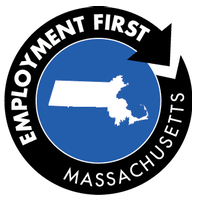Making Community Connections for Transition-Age Youth: Melrose Rotary Club, Melrose, MA
Background
The Melrose Rotary Club’s partnership with the local high school started with a parent of a transition-age student with intellectual disabilities. When a friend invited Susan Nadworny to a Rotary Club meeting a few years ago, Susan saw an opportunity to engage the local business community in improving opportunities for her son and other youth with disabilities.
In particular, Susan wanted to expand access to local jobs and internships. She wanted her son and others at the high school to gain work experience and develop networks in their own community, rather than relying on out-of-district placements that involved work experiences far from home. The local school system had a vocational program, but needed more connections and more jobs in the community.
After a year as a Rotary Club member, Susan approached the Rotary Club president with her ideas. They formed a committee to discuss options and brainstorm ways to partner with the local school system. As the club president said, “She found a hole in the system and went to the Melrose Rotary Club to help fill that hole.” The resulting partnership started expanding work experience and employment opportunities for high school students with disabilities in fall 2011.
Implementation
High school students with disabilities come to weekly Rotary Club meetings, to set up the room beforehand and to serve as wait staff. This role was previously a volunteer job for the Rotarians, but it was converted to a paid job for the students. The Rotary Club raised its lunch prices in order to pay the students for their work.
Involving the students at the meetings allows the Rotarians and the students to become more familiar and comfortable with one another. The students also gain job skills and experience, and the Rotary Club members have come to appreciate the students’ skills and abilities. The members love having the students do this job and enjoy their presence. In fact, when the students took the month of August off, they were sorely missed.
Employers who are members of the Rotary Club have also been asked to provide job tours, inviting students to come visit their businesses. While the job tours do not involve any commitment to hiring a student, they do give students exposure to different kinds of paid work available locally. In addition, the tours have led to several jobs for students, primarily part-time and short-term positions.
The program is just getting started, and some barriers still must be addressed. Funding is inadequate to hire job coaches who could help students to participate in jobs outside of school hours. Transportation is also a challenge. However, students in the program do learn about jobs closer to their homes and schools, which helps reduce this issue.
Impact
Through this partnership, students in Melrose have participated in jobs at various local businesses including the YMCA, a gas station, an accountant’s office, and a furniture store. Four of the seven participating students have begun working between one and four hours per week, with job responsibilities including shredding, filing, stocking, and cleaning. Local business owners who have hired students feel that they are contributing to the community. The Rotary Club sees the project as “one of the programs we’re quite proud of.”
Longer-term outcomes remain to be seen since the program is so new. But the ability to provide local education and work opportunities is potentially beneficial for the students, the community, and the school system. Students are able to develop relationships at school and in the community that can be sustained as they transition to adulthood.
The combination of work experience and local contacts is expected to lead to more local employment opportunities after graduation, which will benefit both students and businesses. The school system also is in a position to save money by not having to place as many students in expensive out-of-district vocational programs.
Suggestions for Replication
For parents & advocates: Accept that this is a process. It takes time to build relationships and gain involvement from community members. For example, Susan spent a year simply participating in Rotary Club meetings and building relationships with the members, and another year forming a committee and getting other members on board, before the program actually began.
The time investment was worth it, however, because the Rotary Club members became engaged and students began to access work opportunities that previously were not available to them. Organizations such as the Rotary Club are often seeking opportunities to address issues in their communities, so engaging such groups can help a community to come together to support local youth.
For schools: Just try it–you may be surprised at the results. If at all possible, involve a parent advocate in the endeavor; parents who are likely to support such a program understand the students’ skills and abilities and are motivated to connect these students to local work opportunities.
For Rotary Clubs: Work closely with the school system. School personnel were instrumental in setting up the program and supporting the students. Having a professional there at the meetings with the students to provide support has been particularly useful.
##For More Information
Susan Nadworny, Melrose Rotary member and parent-advocate
snadw@aol.com
781-665-5179
Mark Hutchinson, Melrose Rotary Club President
mark@melrosema.com
781-665-2222
Cheryl Whitney, Special Education Teacher, Melrose High School
cwhitney@aol.com
781-244-8181
Jennifer Sullivan Sulewski, Research Associate
Institute for Community Inclusion
jennifer.sulewski@umb.edu
617-287-4356
